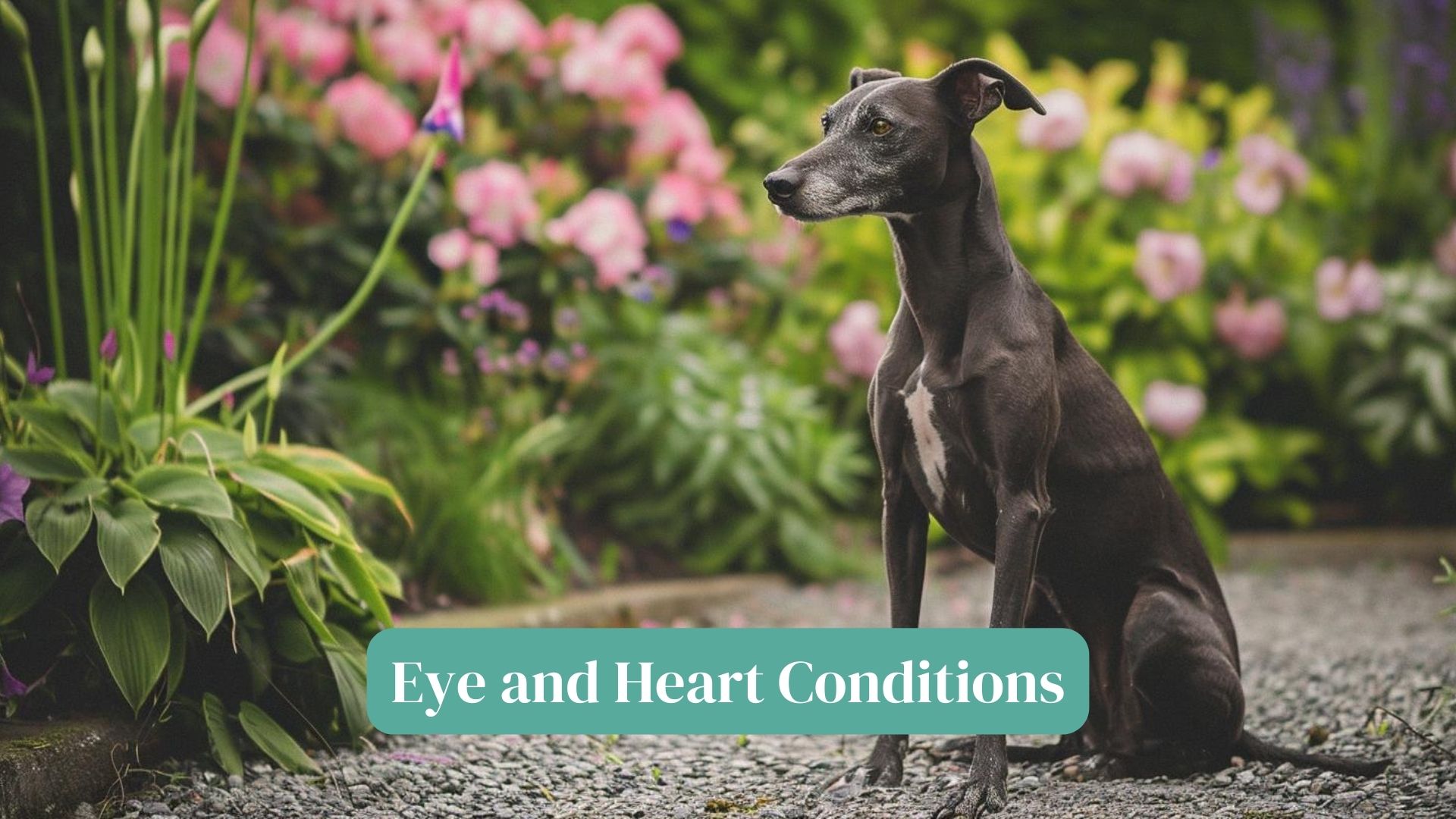As a greyhound owner, you want your furry friend to stay healthy and happy. However, like all dog breeds, greyhounds can face certain health issues.
By learning about these common concerns, you’ll be better prepared to keep your greyhound in top shape.
In this blog post, we’ll explore the most frequent health problems greyhounds may encounter, including dental issues, bone cancer, bloat, and eye conditions.
We’ll also provide tips on preventing and managing these concerns so you can ensure your greyhound lives a long and healthy life with you.
Major Health Concerns in Greyhounds
While greyhounds are generally healthy, they are prone to certain health issues that owners should be aware of.
1. Dental Issues
Prevalence and Significance
Dental problems are more common in greyhounds than in many other dog breeds. Studies have shown that up to 40% of greyhounds may suffer dental issues.
Poor dental health can lead to more serious health problems, such as heart, liver, and kidney infections.
Prevention and Treatment
Establish a daily dental care routine that includes brushing your greyhound’s teeth and giving it dental chews to keep its teeth healthy.
Regular professional dental cleanings and exams are also important. Watch for signs of dental problems, such as bad breath, bleeding gums, or loose teeth, and consult your vet if you notice any of these issues.
2. Osteosarcoma (Bone Cancer)
Signs and Early Detection
Osteosarcoma is a serious bone cancer that can affect greyhounds. Watch for symptoms like limping or swelling in the legs, and schedule regular check-ups with your vet for early detection. Your vet may use imaging tools like X-rays to diagnose osteosarcoma.
Treatment Options and Prognosis
Treatment options for osteosarcoma include surgery, chemotherapy, and palliative care. The prognosis and quality of life after diagnosis depend on several factors, such as the stage of the cancer and the dog’s overall health. Discuss treatment options and expected outcomes with your vet.
3. Bloat (Gastric Dilation Volvulus)
Explanation of the Condition and Its Seriousness
Bloat occurs when a dog’s stomach fills with gas, food, or fluid and twists on itself. This is a life-threatening emergency that requires immediate veterinary care.
Bloat can cause the stomach to pressure other organs and restrict blood flow.
Preventative Measures and Emergency Actions
To help prevent bloat, feed your greyhound smaller, more frequent meals and avoid exercise right before or after eating. Use slow-feeder bowls to discourage gulping.
Know the signs of bloat, such as a swollen, hard abdomen, restlessness, and unproductive vomiting. If you suspect bloat, take your greyhound to the vet immediately.
Eye and Heart Conditions in Greyhounds

While greyhounds are generally healthy, they can be prone to certain eye and heart conditions.
Regular check-ups and preventative care can help catch these issues early and prevent serious health problems.
4. Pannus and Other Eye Conditions
Description of Common Eye Problems
Pannus, also known as chronic superficial keratitis, is a common eye condition in greyhounds that causes a dark film to cover the cornea, potentially leading to vision loss.
Progressive Retinal Atrophy is another eye disorder that gradually affects the retina and can cause blindness. Less common eye issues in greyhounds include cataracts and glaucoma.
Recommended Regular Eye Care and Treatments
Schedule regular eye exams with your vet to detect any issues early on. Treatment for eye conditions may include topical medications for Pannus or supplements to slow the progression of retinal diseases.
Protect your greyhound’s eyes from harsh wind and sun, and watch for signs of irritation or changes in appearance.
5. Heart Issues
Common Cardiac Problems
Greyhounds may be prone to heart conditions such as heart murmurs and high blood pressure. These issues can affect your dog’s overall health and may progress differently in greyhounds than other breeds.
Monitoring and Managing Heart Health
Regular check-ups that include listening to your greyhound’s heart with a stethoscope are important for monitoring heart health.
In some cases, your vet may recommend an echocardiogram. You can support your dog’s heart health through a healthy diet, appropriate exercise, and reducing stress.
Watch for symptoms like coughing, tiredness, or difficulty with physical activity, and consult your vet if you notice any concerns.
Musculoskeletal and Neurological Concerns in Greyhounds
Greyhounds are known for their athletic build and love of running, but these characteristics also make them more prone to musculoskeletal and neurological issues.
As a greyhound owner, it’s important to understand these conditions to provide proper care and take preventive measures.
6. Injuries and Arthritis
Common Injuries
Due to their high-speed activities, greyhounds may be more likely to experience muscle strains, fractures, and tendon injuries. These injuries often occur in the legs, hips, and back.
Prevention and Management of Musculoskeletal Issues
To help prevent injuries, make sure your greyhound warms up before exercise and runs on appropriate surfaces.
Avoid overtraining, and schedule regular check-ups with your vet to catch any signs of arthritis early on.
Your vet may recommend supplements like glucosamine or omega-3 fatty acids to support joint health.
Rehabilitation practices and supportive gear, such as joint braces, can also help manage musculoskeletal issues.
7. Polyneuropathy
Genetic Predisposition and Impact on Nerve Function
Polyneuropathy is a genetic condition that affects some greyhounds, causing a progressive deterioration of nerve function. This condition can impact your dog’s mobility and quality of life.
Signs and Non-Treatment Approaches
Watch for signs of polyneuropathy, such as weakness, poor reflexes, or an unusual gait. While there is no cure for this condition, supportive care can greatly improve your greyhound’s quality of life.
This may include physical therapy, adaptive equipment to help with mobility, and making changes to your home to ensure your dog’s safety and comfort.
Other Health Considerations in Greyhounds
While it’s important to be aware of the major health concerns that can affect greyhounds, other specific needs and sensitivities should be considered for their overall well-being.
Understanding these needs can help you ensure a healthy lifestyle for your greyhound.
8. Cold Sensitivity
Challenges Due to Low Body Fat
Greyhounds have a low body fat percentage, which makes it harder for them to maintain their body heat and can make them more sensitive to cold temperatures.
This sensitivity can affect their health, comfort, and behavior.
Strategies to Maintain Warmth and Comfort
To keep your greyhound warm, use thermal beds, keep your home comfortable, and provide protective clothing like sweaters and coats when going outside.
During cold weather, limit outdoor time and find indoor exercise options.
9. Diet and Nutrition
Nutritional Needs Specific to Greyhounds
Greyhounds have unique dietary needs, including higher protein and appropriate fat content to support their energy levels and muscle health.
Feed your greyhound smaller, more frequent meals to prevent bloat and maintain good digestive health.
Meal Composition
Look for high-quality, commercially available diets formulated for high-energy dogs.
Ensure your greyhound’s diet is balanced and includes essential vitamins and minerals for long-term health.
10. Drug Sensitivity
Unique Sensitivities to Medications and Anesthesia
Due to their unique physiology and low body fat, greyhounds may respond differently to certain medications and anesthesia.
Some common drugs and anesthetic agents may require adjusted dosages or extra caution.
Considerations for Veterinary Procedures
Before any veterinary procedure involving sedation or anesthesia, discuss your greyhound’s specific needs with your vet.
After the procedure, closely monitor your dog for adverse reactions or prolonged recovery times.
Conclusion
By understanding the common health concerns that can affect greyhounds, you can take proactive steps to keep your furry friend in the best possible shape.
Regular vet check-ups, preventive care, and a watchful eye for signs of trouble can ensure your greyhound lives a long, healthy, and happy life by your side.
Remember, early detection and prompt treatment are key to managing any health issues that may arise.
You can help your greyhound thrive and enjoy many wonderful years together with proper care and attention.
If you have any concerns about your greyhound’s health, don’t hesitate to consult your veterinarian for guidance and support.






